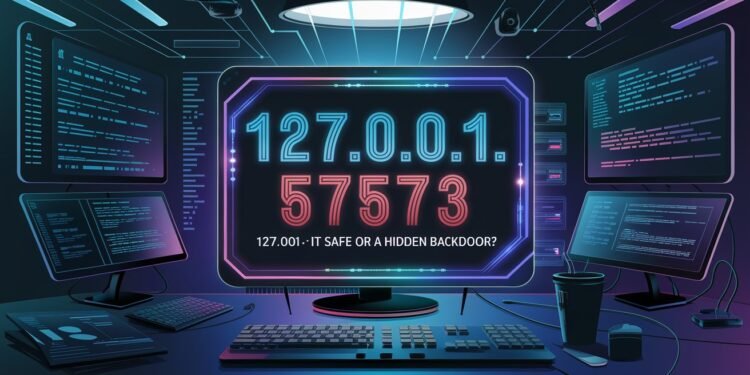The IP address 127.0.0.1, also known as localhost, is a loopback address that allows a computer to communicate with itself. When combined with port 57573, it refers to a specific service or application running locally. While this may sound suspicious, it is typically used for legitimate local connections rather than as a backdoor. However, understanding its role is crucial to ensure network security and troubleshoot issues effectively.
What Is 127.0.0.1?
The address 127.0.0.1 is reserved for local use and does not interact with the internet. It allows applications to communicate with one another within the same device without exposing data externally. This is useful for:
- Local web development – Developers test websites and applications without using external servers.
- Database management – Databases use localhost for secure, local connections.
- Custom applications – Some software opens local ports for communication between different components.
Table of Biography for “127.0.0.1:57573”
| Attribute | Details |
|---|---|
| IP Address | 127.0.0.1 |
| Port Number | 57573 |
| Type | Loopback (Localhost) |
| Primary Function | Internal communication within a device |
| Common Uses | Web development, database connections, internal software testing |
| Security Risks | Potential malware misuse, unauthorized local access |
| Monitoring Commands | netstat -ano (Windows), lsof -i :57573 (Mac/Linux) |
| Potential Issues | Port conflicts, firewall blocks, misconfigured services |
| Safe to Use? | Yes, if managed properly |
| Alternative Ports | Any other unused dynamic port (49152–65535) |
| Solution for Issues | Identifying processes, closing unused ports, configuring firewalls |

Understanding Port 57573
A port number identifies a specific service or application on a computer. Port 57573 is a dynamic (ephemeral) port temporarily assigned by the operating system when a local application requires communication. It can be used for:
- Temporary local services – A testing server may temporarily assign this port.
- Client-side connections – When an app connects to a local service, the OS assigns an ephemeral port like 57573.
Because this is a dynamic port, its use can change every time a program runs.
Is 127.0.0.1:57573 a Security Threat?
In most cases, 127.0.0.1:57573 is not a backdoor but an internal communication channel used by your system or an installed application. However, potential risks include:
- Malware or rogue applications – If a malicious program runs on your device, it could use this port to establish hidden connections.
- Misconfigured software – A program running on this port could expose sensitive data if improperly configured.
- Port conflicts – Multiple applications using the same port can lead to connection issues.
How to Check What’s Running on Port 57573
To see what application is using 127.0.0.1:57573, use the following commands:
Windows
- Open Command Prompt.
- Run:cmdCopyEdit
netstat -ano | findstr :57573 - Identify the Process ID (PID).
- Open Task Manager, find the corresponding PID, and see which application is using it.
Mac/Linux
- Open Terminal.
- Run:bashCopyEdit
lsof -i :57573 - Review the process details.

Troubleshooting Issues with 127.0.0.1:57573
- Check if the Service is Running
If a program is expected to use this port but is unresponsive, verify it is running correctly.
- Verify Port Accessibility
Firewalls or security software may block the port. Check your firewall settings and allow local traffic if necessary.
- Look for Port Conflicts
Conflicts can occur if multiple applications try to use port 57573. Use the commands above to find and resolve conflicts.
- Inspect Application Configurations
Ensure this port’s software is correctly configured and does not unintentionally expose sensitive data.
How to Secure 127.0.0.1:57573
Even though localhost connections are generally safe, best security practices include:
- Using strong passwords and authentication for local services.
- Limiting access to localhost to prevent unintended external access.
- Keeping software up to date to patch potential vulnerabilities.
- Using network monitoring tools to detect unusual activity.
FAQs
Can hackers exploit 127.0.0.1:57573?
Since 127.0.0.1 is a loopback address, external hackers cannot access it directly. However, if malware runs on your computer, local ports like 57573 could be exploited for malicious purposes.
Why does my firewall flag 127.0.0.1:57573?
Some security software detects unusual local port activity as a precaution. If a program uses this port unexpectedly, investigate the process using the above commands.
How do I close port 57573?
To stop any process using this port, find its PID (using netstat or lsof) and terminate it through Task Manager (Windows) or kill command (Mac/Linux).
Can I use a different port instead?
Yes, most applications allow you to change the port in their configuration settings if 57573 is causing conflicts.

Conclusion
127.0.0.1:57573 is not a hidden backdoor but a local communication channel for your system or applications. While generally safe, monitoring active ports, checking for suspicious activity, and ensuring that only trusted programs use it is essential. If you notice unusual behavior related to this port, investigate using netstat or lsof commands and secure your system accordingly.
For more detailed information, check sources like PressMagazine.
































Comments 1